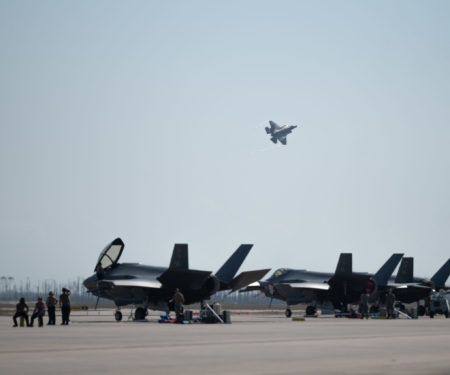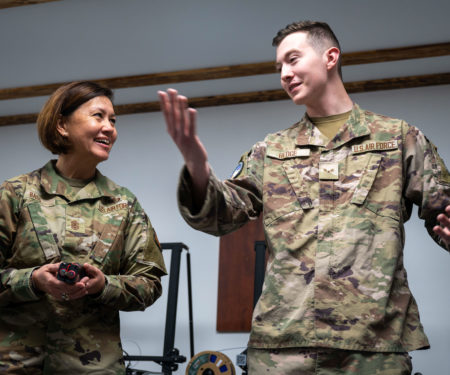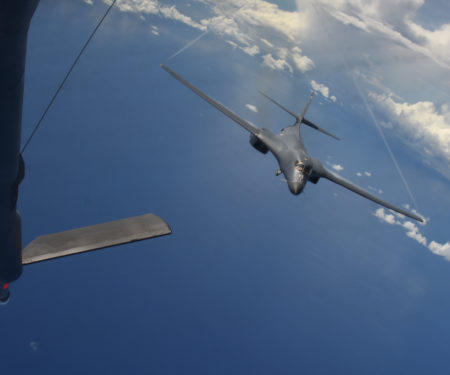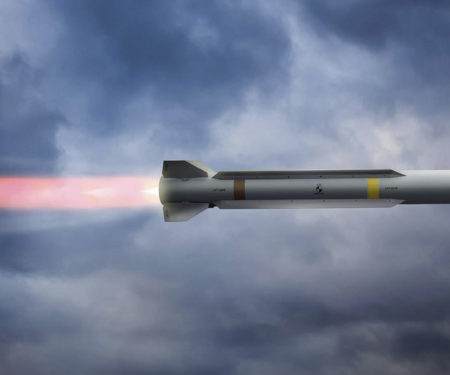‘We’re Weird’: New Commander Details Life Inside Task Force 99
Top Pentagon Official: China’s Air Actions Are ‘Dangerous and Destabilizing’
Fifth-Generation Weapons
Radar Sweep
Commission Looks for Ways to Speed Up Pentagon Budget Process to Keep Pace With China
A congressionally chartered panel is poised to make recommendations for ways to overhaul the way the Pentagon requests and spends hundreds of billions of taxpayer dollars each year—in part so the U.S. military can keep pace with China’s weapons development. The goal is to modernize what’s known as the Planning, Programming, Budgeting & Execution Process so that the military can get its hands on newer technology much faster than it can today.
Robot Dogs Are Taking Over the US Military
It’s been nearly three years since robot dogs first made their operational debut alongside U.S. service members at an American military base, and the quadrupedal sensor platforms have found a growing number of new applications as an extra pair of “eyes and ears” for troops across the armed forces. According to images posted to the U.S. military’s Defense Visual Information Distribution Service on Feb. 24, Cape Cod Space Force Station last week became the latest military installation to receive semi-autonomous quad-legged unmanned ground vehicles (Q-UGVs), or robot dogs, to enhance perimeter security at the Massachusetts base.
Another Air Force Fleet Grounded over Fears Plane Tails May Fall Off
The big search for a tiny component that could cause an airplane’s tail to fall off has uncovered the problem on at least two dozen Air Force jets across at least five aircraft fleets. But the Air Force won’t say exactly how many planes have turned up with potentially dangerous parts. The E-3 Sentry aerial target tracking planes became the latest to undergo inspection for subpar tail pins, the service’s Air Combat Command confirmed March 2.
White House Cybersecurity Strategy Warns of ‘Complex Threat Environment’
The White House on March 2 released a national cybersecurity strategy that points at Russian and Chinese hackers as major threats to U.S. terrestrial and space networks. “We face a complex threat environment, with state and non-state actors developing and executing novel campaigns to threaten our interests,” the White House said.
ChatGPT Can Make Short Work of Pentagon Tasks, Air Force CIO Says
Generative artificial intelligence like the wildly popular ChatGPT has a promising future at the U.S. Department of Defense, where time-consuming tasks and red tape can clog the path to accomplishment, according to Lauren Knausenberger, the Air Force’s chief information officer. A smart assistant or AI-powered chatbot could efficiently find files, answer frequently asked questions, or dig up contact information, among other menial assignments, Knausenberger said.
Drones Armed with Precision-Fired Nets Protecting US Strategic, Ukrainian Critical Sites
The U.S. government is protecting select strategic sites from small-uncrewed air systems with new counter-drone technology developed by a Utah startup that nabs a threat mid-air with a net, a system that is also proving itself in operations over Ukraine by thwarting some Russian intelligence, surveillance, and reconnaissance missions as well as kamikaze drone strikes.
State of the Air Force and Space Force 2023
The U.S. Air Force’s year brought an unexpected first: an air-to-air kill by an F-22 Raptor. But the shootdown wasn’t of an enemy fighter jet; instead, the Raptor brought down a suspected Chinese spy balloon. The incident—and the subsequent downings of three more unidentified flying objects—drew attention to the security of United States airspace, the role the Air Force plays in national security, and above all, the potential threat from China.
Air Mobility Command Removes Tail Numbers and Unit Info from Planes, Alarming Watchdogs
Air Mobility Command has directed its refueling and cargo planes to obscure the majority of identifying information painted on the aircraft, citing national security concerns—an unusual move that is alarming to government watchdogs. James Stewart, a spokesman for Air Mobility Command, told Military.com in an emailed statement that airmen's missions take them around the globe and often involve sensitive movements of cargo—the main reason behind the change.
Baby On-Board? Pregnant Air Force B-1 Pilot Soars to New Heights
Air Force pilot Maj. Lauren Olme married her husband, Maj. Mark Olme, seven months after graduating from the Air Force Academy. The duo deployed across the world together, flying overseas missions in B-1 Lancers before returning stateside to complete the elite U.S. Air Force Weapons School course. Now, a new, much smaller member of the family is getting in on the action.






